Life Sciences News
See our Latest Journal Publications
University of Warwick ranked eighth in the UK by the Guardian University Guide with Life Sciences listed in top 5 departments for biosciences
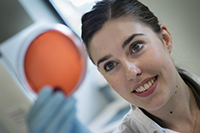 The University of Warwick has once again been ranked top ten in the latest UK university league table with Biosciences (Life Sciences) listed in the top five in the UK.
The University of Warwick has once again been ranked top ten in the latest UK university league table with Biosciences (Life Sciences) listed in the top five in the UK.
Read Press Release
Ebola: lives to be saved with new management approach
Ebola outbreaks are set to be managed quickly and efficiently – saving lives – with a new approach developed by an international team of researchers, including the University of Warwick, which helps to streamline outbreak decision-making.
Dr Michael Tildesley from the School of Life Sciences - with researchers from Penn State University in the USA – have discovered that educating people in areas affected by Ebola about how the disease spreads through communities is the most effective strategy for halting an epidemic.
26 May 2017: Inaugural Elizabeth Creak Distinguished Guest Lecture on Food Security
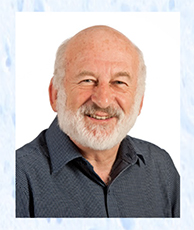 On Friday 26 May Professor John A Pickett, from Rothamsted Research, will be coming to the School of Life Sciences to give the Inaugural Elizabeth Creak Distinguished Guest Lecture on Food Security. The title of his presentation is 'Global food security: removing production constraints with GM but learning from nature'.
On Friday 26 May Professor John A Pickett, from Rothamsted Research, will be coming to the School of Life Sciences to give the Inaugural Elizabeth Creak Distinguished Guest Lecture on Food Security. The title of his presentation is 'Global food security: removing production constraints with GM but learning from nature'.
Abstract:
The need further to intensify, in a sustainable way, global agriculture becomes ever more pressing. Our current tools mainly comprise seasonal inputs for dealing with constraints relating to crop protection and production but delivery of associated traits via seed, and other planting material, sets high demands often without obvious solutions. GM will need to play a major part certainly in dealing with constraints and because of the low impact on primary metabolic processes, secondary plant metabolism presents powerful new targets. By definition, the genetic apparatus for exploitation of these metabolites only requires identification and natural regulatory processes provide evidence of value already realised in some elements of biological control such as companion cropping. Synthetic biology can then extend these opportunities and will be exemplified for the isoprenoid pathway in plant defence and production.
The lecture will be in GLT1 13:00-14:00
Guest Lecture poster
For any queries, please contact the host Professor Murray Grant
Head of Life Sciences shortlisted for BBSRC Innovation Award
 Professor Laura Green, Head of the School of Life Sciences at the University of Warwick, has been shortlisted for an Innovator of the Year award from the Biotechnology and Biological Sciences Research Council (BBSRC).
Professor Laura Green, Head of the School of Life Sciences at the University of Warwick, has been shortlisted for an Innovator of the Year award from the Biotechnology and Biological Sciences Research Council (BBSRC).
Nominated in the ‘Social Impact’ category, Professor Green’s research has led to halving the level of lameness in sheep flocks - from ten percent to five percent - in a decade, saving a million sheep a year from becoming lame.
Free event: Monday 8 May 2017 - Fixing houses to fight Chagas disease
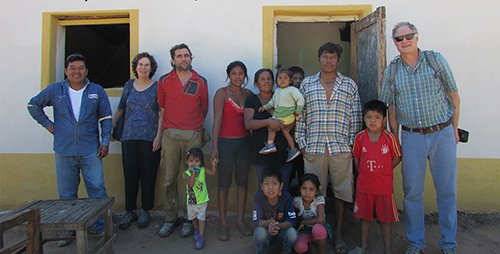
Public talk by Professor Caryn Bern of University of California, San Francisco 'Fixing houses to fight Chagas disease'.
Please register to attend this free event. Spaces are limited on a first come first served basis.
Chagas disease is caused by a parasite transmitted to humans by a large bloodsucking insect called a triatomine, which lives in the walls and roofs of rural mudbrick houses in Latin America. In the southern Bolivian villages where we work, more than half the people are infected and about a third develop potentially fatal Chagas heart disease. Come and learn about the disease and our project to improve houses using local materials to reduce places for the insects to hide and prevent children from becoming infected in the first place.
Please note: This event will take place in the Oculus Building, OC0.03 from 6-8pm. Refreshments and a selection of sandwiches and wraps will be available on arrival.
This presentation will be led by Professor Caryn Bern, University California, San Fransico, in collaboration with the University of Warwick School of Life Sciences.
Further Information: Caryn is currently visiting the SLS and Mathematics departments on an Institute of Advanced Study International Visiting Fellowship. Caryn is an expert on neglected tropical diseases (NTD), particularly Visceral Leishmaniasis and Chagas disease, and has a wealth of experience in field research from working at the Centers for Disease Control in the US for 20 years. For more information about the research that the University of Warwick is carrying out on NTD, please visit the NTD Modelling Consortium webpages.
Bill Gates praises University of Warwick’s impact in fight against Neglected Tropical Diseases
Speaking at the Geneva summit on Neglected Tropical Diseases (NTDs), Bill Gates, co-Chair of the Bill & Melinda Gates Foundation, today applauded the efforts of UK scientists in protecting the world’s poorest people from NTDs: “UK aid and Britain’s world-leading research institutions like the University of Warwick are playing a major role in protecting the world’s poorest people from Neglected Tropical Diseases and enabling them to live healthier, more prosperous lives.”
The University of Warwick’s research, which is part-funded by the Bill & Melinda Gates Foundation, focuses on providing quantitative data on the prevalence of NTDs and the impact of the intervention programmes designed to combat them.
Dr Deirdre Hollingsworth, Associate Professor in Epidemiology at the University of Warwick, said: “We’re delighted to be part of the international effort to rid the world of these terrible diseases. Over the last two years we have made significant progress in understanding how these diseases spread, measuring the impact of eradication efforts and highlighting areas where additional interventions will be required to achieve our 2020 goals. We're optimistic that, with continued coordination and investment, we can protect more of the world’s poorest communities from NTDs.”
Read the Press Release
Catapult open for business with £1m investment in cutting-edge lab capacity to support UK drug discovery
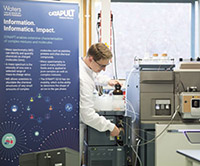 World-class technology and expertise are now available to UK drug discovery companies as a result of new laboratory facilities developed by the Medicines Discovery Catapult and launched on Wednesday 29th March at the University of Warwick.
World-class technology and expertise are now available to UK drug discovery companies as a result of new laboratory facilities developed by the Medicines Discovery Catapult and launched on Wednesday 29th March at the University of Warwick.
Professor Chris Dowson welcomed the addition of the Medicines Discovery Catapult to the University. He said:
“This Catapult laboratory has an extraordinary amount of capability in a small space, enabling us to make great advances in microbiology, chemistry and structural biology.
Read the Press Release
Free Public Science Evening: Tuesday 2 May 2017
The microbes on us and around us: We can't see them but can't live without them
We all have one, but what is a microbiome? Come and find out at the School of Life Sciences Public Science Evening on Tuesday 2 May.
The event will explore the impact of the microbiome on animals, plants and humans and the huge impact that your microbiome has on you and your health. Come and discover how we can manipulate microbiomes to reduce the spread of antibiotic resistance.
This event is led by Professor Elizabeth Wellington and follows on from our highly successful Public Science Evenings covering topics such as Neurobiology, Antibiotic Resistance and Plant Pathogens.
The event will include a variety of talks, lab tours and interactive stalls as well as the chance to speak to experts in this field. Light refreshments will be provided. The event will take place in the School of Life Sciences Atrium, Gibbet Hill Campus from 18:00 – 20:00.
Register your place(s).
World TB Day 24 March
On the 24 March 2017 the Fullam lab will be at Cannon Park Shopping Centre from 11:00-19:00.
Come and join us to find out more about TB, and the research that we are doing. There will be the opportunity to talk to people from the lab, take part in a number of competitions to win a tuberculosis petri dish (sponsored by Giant Microbes) and also win a voucher for the best selfie taken in our World TB Day Instaframe that is uploaded to the twitter #WarwickTB. There will be leaflets, balloons and stickers and an interactive activity featuring the 'Big Mouth' clown. Come and join us!
Learn more from our TB video
Any questions, please get in touch with warwickTB@warwick.ac.uk
Biochemistry students reunite after thirteen years
 On 17 March 2017 at a Wellcome Trust Fellows meeting, three Life Sciences students were reunited. Dr Philip Elks, Dr Amy Saunders and Dr Thomas Clarke graduated in 2004 with degrees in Biochemistry. From an undergraduate class of thirty they feel it’s pretty impressive that three of them have secured prestigious Wellcome Trust/Royal Society Sir Henry Dale fellowships which have enabled them to set up their own research groups at the Universities of Sheffield, Manchester and Imperial. They have fond memories of Life Sciences and the School wishes them every continued success in their careers.
On 17 March 2017 at a Wellcome Trust Fellows meeting, three Life Sciences students were reunited. Dr Philip Elks, Dr Amy Saunders and Dr Thomas Clarke graduated in 2004 with degrees in Biochemistry. From an undergraduate class of thirty they feel it’s pretty impressive that three of them have secured prestigious Wellcome Trust/Royal Society Sir Henry Dale fellowships which have enabled them to set up their own research groups at the Universities of Sheffield, Manchester and Imperial. They have fond memories of Life Sciences and the School wishes them every continued success in their careers.
Dr Emily Noel, from the same year group, is a British Heart Foundation Fellow holder also in Sheffield.
Professor Laura Green appointed to new Science Council
 The Food Standards Agency has announced that Professor Laura Green is to be a member of its new Science Council. The Council will provide high-level, expert and independent advice and challenge to the Agency on how it uses science to underpin its work.
The Food Standards Agency has announced that Professor Laura Green is to be a member of its new Science Council. The Council will provide high-level, expert and independent advice and challenge to the Agency on how it uses science to underpin its work.
New TB drug candidates developed from soil bacteria
A new treatment for tuberculosis (TB) is set to be developed using compounds derived from bacteria that live in soil - according to an international collaboration of researchers, including the University of Warwick.
The research, ‘Sansanmycin Natural Product Analogues as Potent and Selective Anti-Mycobacterials that Inhibit Lipid I Biosynthesis’ is published in Nature Communications today.
The collaboration was led by the University of Sydney, and included the University of Warwick, Monash University, Colorado State University, Simon Fraser University, and the University of Queensland.
Key reagents and expertise in antimicrobial resistance from the research groups of Dr David Roper, Professor Chris Dowson and Professor Tim Bugg at the University of Warwick, played a crucial role in successfully targeting TB bacteria with the new compounds.
Read Press Release
New BBC drama shaped by Warwick expertise
The rise of antibiotic resistance is at the heart of a brand-new BBC drama, written by renowned author Val McDermid – and shaped by scientific expertise from the University of Warwick.
Airing on BBC Radio 4 in March, Resistance is a three-part story about an epidemic of a drug-resistant disease – and was informed by Professor Chris Dowson from the School of Life Sciences, the scientific advisor for the programme.
Read Press Release
Foot-and-mouth crises to be averted with vaccination strategy
 Research by Dr Mike Tildesley and colleagues shows foot-and-mouth epidemics could be controlled quickly and effectively by rapidly establishing how many animals can be vaccinated per day of an outbreak.
Research by Dr Mike Tildesley and colleagues shows foot-and-mouth epidemics could be controlled quickly and effectively by rapidly establishing how many animals can be vaccinated per day of an outbreak.
Read Press Release
Countering the Courgette Crisis
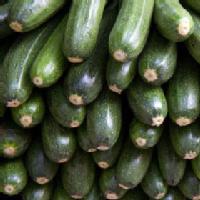 It seems we are facing a Courgette Crisis. Although it’s really just a bit of a run on green vegetables, it does remind us that actually, courgettes – and now iceberg lettuce – shouldn’t be ‘February vegetables’. This raises some important issues about what we as consumers have learned to expect when it comes to food.
It seems we are facing a Courgette Crisis. Although it’s really just a bit of a run on green vegetables, it does remind us that actually, courgettes – and now iceberg lettuce – shouldn’t be ‘February vegetables’. This raises some important issues about what we as consumers have learned to expect when it comes to food.
Researchers at Warwick Crop Centre are looking at ways of improving existing UK vegetable and fruit crops as well as looking for completely new ones.
Professor Kevin Moffat has been shortlisted for the 2017 Higher Education Bioscience Teacher of the Year Award
 The Royal Society of Biology has announced finalists for the 2017 Higher Education Bioscience Teacher of the Year Award. Professor Kevin Moffat has been shortlisted for the award which recognises teachers who have shown an outstanding contribution to higher education in the biosciences.
The Royal Society of Biology has announced finalists for the 2017 Higher Education Bioscience Teacher of the Year Award. Professor Kevin Moffat has been shortlisted for the award which recognises teachers who have shown an outstanding contribution to higher education in the biosciences.
PhD student Daniel Wilson wins poster prize!
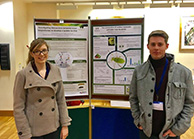
Warwick Crop Centre PhD student Daniel Wilson won first prize for his poster at the Royal Entomological Society Postgraduate Forum held at Sheffield University on 2-3 February. The poster was entitled ' The colonisation of outdoor vegetables and salad crops by aphids'.
Daniel's project is funded by the Waitrose Agronomy Group and the University of Warwick. Daniel is seen here with fellow Warwick PhD student Victoria Woolley who also presented a poster.
Breathing molecule discovered: vital to treating respiratory conditions
Respiratory conditions could be better targeted and treated, thanks to the discovery of the vital molecule which regulates breathing – according to research by the University of Warwick.
Professor Nicholas Dale has exploited evolutionary principles to identify Connexin26 (Cx26) as a key molecule that reacts to CO2 in our bodies and activates breathing.
Breakthrough in stroke detection
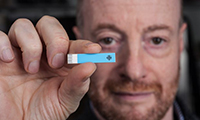 Professor Nicholas Dale and team have developed a unique biosensor technology that has the potential to radically improve the life of stroke victims.
Professor Nicholas Dale and team have developed a unique biosensor technology that has the potential to radically improve the life of stroke victims.
Read full article -The Guardian 22 January 2017
(Photograph: Antonio Olmos for the Observer)
BRAVO: making Brassica crops more resilient
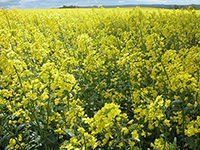 Protecting the UK’s most valuable crops by making them more resilient is at the heart of a new five-year project, in which the School of Life Sciences will play a key role.
Protecting the UK’s most valuable crops by making them more resilient is at the heart of a new five-year project, in which the School of Life Sciences will play a key role.
The Brassica, Rapeseed and Vegetable Optimisation (BRAVO) project, funded by the Biotechnology and Biological Sciences Research Council (BBSRC), aims to combat losses of Oilseed rape and Brassica vegetable crops by unravelling the processes that control key aspects of plant development.
Read Press Release
